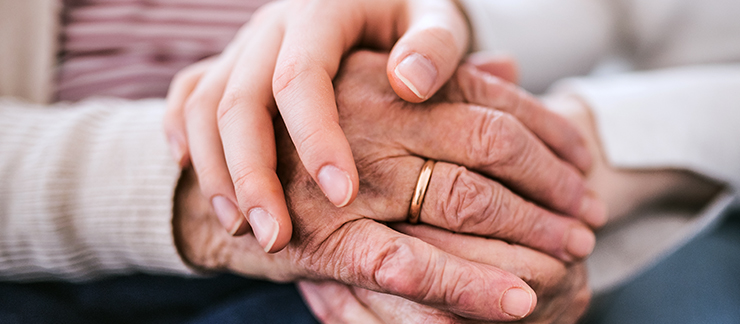
Good Hand Hygiene Reduces Health Risks for Seniors
Have you noticed that your aging mother or father gets colds more often? As we age, our immunity system slows, increasing the risk of colds and flu. Vaccines become less effective and the healing or recovery process takes longer. And while the Centers for Disease Control recommends adults get an annual flu shot, no vaccine exists for the common cold. Finding ways to reduce cold risk becomes important for aging adults. Families and caregivers of seniors should understand the importance of hand hygiene as one of the most important preventative actions to guard against germs that contribute to colds and other diseases.
Colds Can be Serious for Seniors
Adult children should not overlook the effects of cold and influenza on their elderly parents. According to the Centers for Disease Control, adults over the age of 65 years, especially those with chronic conditions such as diabetes, are at greater risk of serious complications from the flu as immune defenses become weaker with age. The flu can lead to infections such as pneumonia or complicate existing conditions, including asthma and heart disease.
Seniors can take steps to increase their immune system with regular exercise and healthy foods. However, germs play a major impact on who may get a cold. Viruses are a type of germ that can enter a body and cause a person to become sick. Infections can result when germs grow inside the body. Over 200 different viruses cause the common cold.
How Germs Spread on Hands
While only a small portion of germs cause disease, four out of five germs do cause illness and are commonly spread by our hands. In fact, 80% of infectious disease is caused by touch. Invisible to detect, even clean hands can contain microscopic dirt that gets into the mouth, nose, eyes and, eventually, into the body. Germs can spread on hands in different ways:
- Handling food.
- Emptying trash.
- Using the toilet.
- Tending a wound.
- Caring for a sick person.
- Handling pets or their waste.
- Coughing or sneezing into hands.
Handwashing is an excellent prevention technique to decrease the spread of germs. In fact, the Centers for Disease Control reports that hand hygiene is one of the most important ways to prevent the spread of germs, including those resistant to antibiotics.
Hand Hygiene Facts
It only takes just 20 seconds to wash hands properly. Most of us accomplish that task unsuccessfully in 5 seconds, not enough time to rid hands of germs. Using clean, running water and regular soap is sufficient to remove germs. Soap is important to handwashing as it contains surfactants that help remove germs from the skin. Plain soap works faster than antibacterial soap in removing germs.
The Mayo Clinic offers these simple steps for hand washing:
- Wet hands with clean, running water, then turn off the tap and apply soap.
- Lather hands by rubbing them together with the soap. Lather the backs of hands, between fingers, and under nails.
- Scrub hands for at least 15 - 20 seconds – the time approximately equal to humming the “Happy Birthday” song from beginning to end twice.
- Rinse all side of the hands well under clean, running water. Rinsing removes dirt and microbes loosened when scrubbing.
- Turn off the tap with a tissue or towel.
- Dry hands using a paper towel.
Wash hands often to fend off germs, especially when entering or leaving your aging loved one’s home. When covering the nose and mouth while sneezing, use an elbow or tissue so as not to contaminate hands. If using tissues, properly dispose of them in the trash, and wash hands immediately.
Use Sanitizer in a Pinch
If soap and water are not available, use a hand sanitizer that can eliminate 99% of germs. Use one with at least 60% alcohol. The Centers for Disease Control recommends these tips when cleaning hands with sanitizer:
- Apply sanitizer to palms
- Rub into palms and over hands and fingers for 20 – 30 sec.
- Cover entire hand area
- Rub hands until dry
Hand sanitizer might be a good option for seniors challenged with mobility. While hand sanitizers do a good job, they may not remove certain germs such as a stomach bug called norovirus, some parasites and Clostridium difficile that causes diarrhea. Hand sanitizer should not serve as a permanent substitute for hand washing with soap and water - that is the best way to eliminate germs.
Visiting Angels Caregivers Are Trained in Good Hand Hygiene
Visiting Angels provides hand hygiene education to its caregivers to reduce the chance of spreading germs among clients. Our employees understand when and how to wash hands to eliminate germs when caring for your loved one. They also know the importance of cleaning surfaces throughout the home to protect everyone who enters or lives in the home against germs.
Touching unclean surfaces can re-contaminate even just-washed hands. Cleaning surfaces helps reduce the spread of germs onto the hands. If outlined as a task under the care plan, caregivers will disinfect surfaces and wipe down high traffic spots such as phones, doorknobs, bedrails, and remotes. We also direct caregivers to wear gloves only once as they, too, can carry germs.
Working together with our clients and their families, Visiting Angels caregivers use safeguards such as handwashing to prevent the spread of germs and infection so that your loved one maintains good health and a high standard of living for years to come.
Read: Exercise Benefits for Seniors Range from Chronic Disease Prevention to Boosting Immune System


